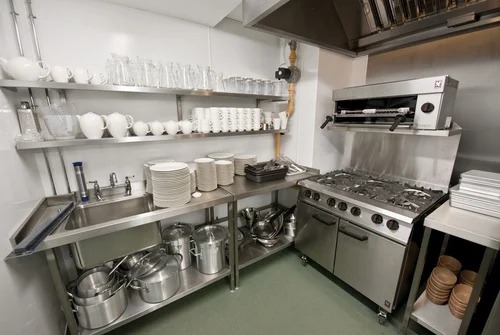Every successful food business—whether it’s a restaurant, cloud kitchen, hotel, bakery, canteen, or catering setup—depends heavily on the quality of its Commercial Kitchen Equipment. In modern food service operations, the expectations of customers have changed. They want faster service, fresher food, and consistent taste. To meet these expectations, a professional kitchen must be equipped with machines that make cooking faster, safer, and more efficient.
A commercial kitchen is completely different from a home kitchen. It needs powerful machines that can run for long hours, handle high volumes, and maintain hygiene standards. This is why choosing the right equipment is one of the most important decisions for any food entrepreneur.
Why Commercial Kitchen Equipment Matters Today
1. Faster Operations for High Demand
Restaurants and cloud kitchens work under strict timelines. One delay can affect the entire service chain. Advanced cooking ranges, ovens, fryers, and griddles help chefs prepare food quickly even during peak hours. Speed increases customer satisfaction and boosts sales.
2. Uniform Taste & Quality Control
Consistency is crucial in the food business. Good equipment maintains stable temperature, even heating, and perfect cooking cycles. This ensures customers enjoy the same taste every time they visit.
3. Hygiene & Safety Standards
With rising awareness about food safety, the demand for hygienic kitchens is higher than ever. Commercial equipment is made from stainless steel and food-grade materials that prevent contamination. Machines with sealed bodies, smooth finishes, and temperature controls help maintain safety standards.
4. Efficient Use of Space
Modern kitchen equipment is designed to give maximum output in minimum space. Undercounter refrigerators, compact dishwashers, multipurpose ovens, and vertical storage racks help maintain a clean, well-organized kitchen.
Popular Types of Commercial Kitchen Equipment
1. Cooking Line Equipment
This is the heart of any commercial kitchen. The cooking line usually includes:
-
Heavy-duty gas ranges
-
Induction cooktops
-
Deep fryers
-
Commercial ovens
-
Salamander grills
-
Tandoors
-
Griddles & hot plates
These machines handle continuous cooking and help chefs deliver dishes with consistency and precision.
2. Refrigeration & Cooling Equipment
Proper storage is essential to avoid spoilage and maintain freshness. Common equipment includes:
-
Double-door refrigerators
-
Deep freezers
-
Blast chillers
-
Undercounter chillers
-
Display coolers
Reliable cooling equipment minimizes food wastage and keeps ingredients fresh for longer.
3. Food Preparation Equipment
To reduce manual labor and speed up prep time:
-
Dough kneaders
-
Planetary mixers
-
Vegetable cutting machines
-
Meat mincers
-
Pulverizers & grinders
These machines help staff prepare ingredients in a fraction of the time compared to manual work.
4. Washing & Cleaning Systems
Clean utensils and tools are essential for any food establishment:
-
Hood-type dishwashers
-
Conveyor dishwashers
-
Glass washers
-
Stainless steel sinks
A proper dishwashing setup ensures hygiene and reduces staff workload.
5. Service & Storage Equipment
To organize inventory and serve food conveniently:
-
Hot & cold bain maries
-
Service counters
-
Food warmers
-
SS shelves & racks
-
Trolleys
This equipment improves the overall workflow and creates a smooth service environment.
How to Select the Best Commercial Kitchen Equipment
1. Plan Your Menu First
Your equipment should be chosen based on what you plan to serve.
For example:
-
A bakery needs proofers, deck ovens, and mixers
-
A fast-food outlet needs fryers, grills, and refrigeration
-
A North Indian restaurant needs tandoors and ranges
Menu decides the machinery—not the other way around.
2. Check the Kitchen Layout
A well-planned layout improves safety and productivity. Always check dimensions and choose equipment that fits your available space without blocking movement.
3. Compare Build Quality & Durability
Look for:
-
Stainless steel construction
-
Easy-to-clean surfaces
-
Reliable electrical & gas components
-
Good insulation and safety features
Quality equipment lasts longer and performs better under pressure.
4. After-Sales Service & Maintenance
Choose brands or suppliers who provide:
-
Quick installation
-
On-site service
-
Availability of spare parts
-
Warranty support
This reduces downtime and prevents business disruptions.
5. Energy Efficiency
Modern machines come with:
-
Low gas consumption
-
Less electricity usage
-
Temperature control systems
Energy-efficient equipment saves money every month.
Advantages of Using Professional Kitchen Equipment
-
Better workflow and time management
-
Uniform and high-quality food output
-
Reduction in wastage and operational cost
-
Safe and hygienic workspace
-
Higher profitability due to fast service
-
More comfort for chefs and staff
-
Professional brand image for your restaurant or kitchen
A well-equipped kitchen can transform your entire business performance.
Conclusion
Commercial kitchen equipment is the backbone of every successful food service business. Restaurant Commercial Kitchen Equipment in Noida From cooking and preparation to cleaning and storage, every machine plays a crucial role in delivering quality food quickly and safely. Whether you are opening a restaurant or upgrading your kitchen, investing in reliable, high-quality equipment ensures long-term performance, smooth operations, and satisfied customers.


